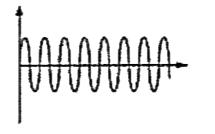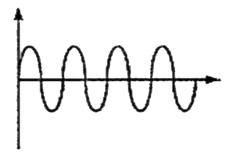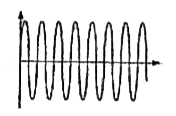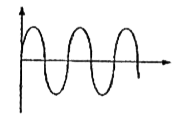Which of the following sound waves produces the loudest sound?




To determine which of the given sound waves produces the loudest sound, we can follow these steps:
1. Understand the Concept of Loudness:
- Loudness of a sound is directly related to the amplitude of the sound wave. The greater the amplitude, the louder the sound.
2. Identify the Amplitudes:
- Look at the four sound waves provided in the question. Each wave will have a certain amplitude, which is the height of the wave from its rest position.
3. Compare the Amplitudes:
- Measure or visually compare the amplitudes of the four sound waves. The wave with the highest amplitude will produce the loudest sound.
4. Select the Loudest Sound Wave:
- After comparing, identify which sound wave has the highest amplitude. This wave will be the one that produces the loudest sound.
5. Conclude the Answer:
- Based on the comparison, state which option corresponds to the sound wave with the highest amplitude.
Final Answer:
- The sound wave that produces the loudest sound is the one with the highest amplitude, which corresponds to option 3.
- Loudness of a sound is directly related to the amplitude of the sound wave. The greater the amplitude, the louder the sound.
- Look at the four sound waves provided in the question. Each wave will have a certain amplitude, which is the height of the wave from its rest position.
- Measure or visually compare the amplitudes of the four sound waves. The wave with the highest amplitude will produce the loudest sound.
- After comparing, identify which sound wave has the highest amplitude. This wave will be the one that produces the loudest sound.
- Based on the comparison, state which option corresponds to the sound wave with the highest amplitude.
- The sound wave that produces the loudest sound is the one with the highest amplitude, which corresponds to option 3.
Topper's Solved these Questions
- SOUNDBOOK - BEIITIANSCHAPTER - SOUNDEXERCISE - Summative Worksheet (Choose the correct answer)
2 Videos
- SOUNDBOOK - BEIITIANSCHAPTER - SOUNDEXERCISE - Summative Worksheet (In the following statements, tick .T. against those which are true, and .F. against those which are false)
7 Videos
- SOUNDBOOK - BEIITIANSCHAPTER - SOUNDEXERCISE - Formative Worksheet
19 Videos
- MOTIONBOOK - BEIITIANSCHAPTER - MOTIONEXERCISE - IIT JEE WORKSHEET (MATIRX MATCHING)
1 Videos
- WIND, STROM AND CYCLONESBOOK - BEIITIANSCHAPTER - WIND, STROM AND CYCLONESEXERCISE - IIT JEE Worksheet (II. Multiple Correct Answer Type)
1 Videos
Similar Questions
Knowledge Check
Sound waves are
Atransverse mechanical wavesBlongitudinal mechanical wavesCneither (a) nor (b)Dnone of theseSound waves are
AlongitudinalBtransverseCmechanicalDelectromagneticThe sound waves are
Amechanical transverse wavesBmechanical longitudinal wavesCelectromagnetic transverse wavesDelectromagnetic longitudinal waves
Which of the following statement(s) is/are true about sound waves?
(I) They are produced by vibrating objects.
(II) They can travel through a vacuum.
(III) They are longitudinal waves.
(IV) The speed of sound is highest in gas and lowest in a solid.
View SolutionWhich of the following wave phenomenon is not shown by sound wave ?
View SolutionWhich of the following statements is not true about a sound wave ?
View SolutionWhich of the following is NOT a characteristic of sound wave?
View SolutionThe phenomenon which does not takes place in sound waves is
View Solution
